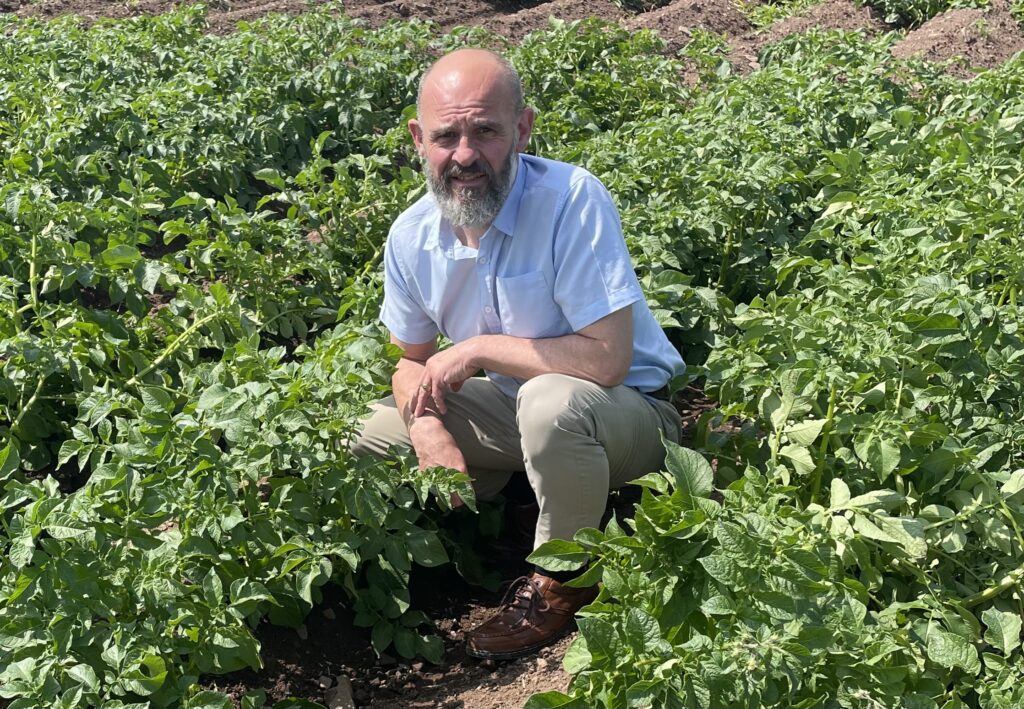Scorching summer shows urgent action is needed for potatoes
A national research project shows that potato farmers across the country need alternatives, fast, to shore up staple veg for the future.
Professor Ian Toth is director of the National Potato Innovation Centre (NPIC), based at The James Hutton Institute. He says that Britain ‘is not prepared’ for how climate change is affecting our crops.
His warnings come as the Met Office declared that 2025 was the warmest summer on record for the UK.
Ways to find new potato varieties that are better suited to warmer, drier weather do exist. But, says Toth, faster action is needed to get these alternatives into production.
“We are not prepared at all for how climate change is affecting our crops.
“It’s very difficult to produce good quality potatoes when the climate is leading to hot, dry weather. Whether it’s this year or next, we are certainly going to see the consequences on potato crops. We are going to be less reliant on what we can produce in the UK and we are going to have to import them.”
Toth said that as extremes in weather become more commonplace, production is becoming less reliable. The work the Centre does to develop varieties that are more resilient to high levels of heat or rain – as well as to new pests and diseases – is well underway. Support is provided by the Scottish Government, but a greater priority at UK level needs to be placed on this work, he added.
“The technology is out there but we need faster action. If we don’t get a move on when we hit crunch time we are in danger of not having the alternatives.”
“It’s very difficult to produce good quality potatoes when the climate is leading to hot, dry weather. Whether it’s this year or next, we are certainly going to see the consequences on potato crops. We are going to be less reliant on what we can produce in the UK and we are going to have to import them.”
Prof Ian Toth, The James Hutton Institute

Head of climate attribution at the Met Office, Dr Mark McCarthy, said: “Our analysis shows that the summer of 2025 has been made much more likely because of the greenhouse gases humans have released since the industrial revolution.
“In a natural climate, we could expect to see a summer like 2025 with an approximate return period of around 340 years, while in the current climate we could expect to see these sorts of summers roughly 1 in every 5 years.”
Last year the National Potato Innovation Centre was one of a range of groups hosting farmers from around the UK to discuss the immediate and long-term threats to their production. Climate change was cited in the top five challenges by farmers, and they also agreed on the need for new, more fit-for-purpose varieties.
Toth added: “We knew this was important but now we have information from the horse’s mouth, to say this is what people want.”
The Institute of Grocery Distribution, or IGD, said this summer that food prices would rise faster than the cost of other goods in 2025 thanks in part to extreme weather events. Its most recent quarterly UK food inflation forecast stated: ‘Extreme heat and dry weather has gripped the UK in 2025 – and the impact on food production is already showing. Core staples like wheat and potatoes are under threat.’
The potato is the world’s third main food crop and the second main food crop in the UK. A report from the NPIC cross-UK farmers’ workshop in 2024 stated that: ‘Understanding the impacts of extreme weather and the longer-term impacts of climate change, including through the modelling of extremes, require action now to better understand and act upon them.’
